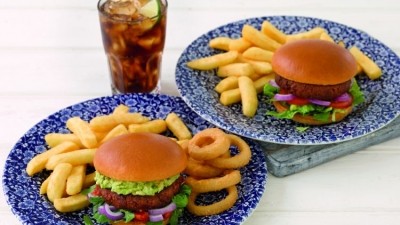Spotlight
Does meat have a future in the pub?

The United Nations commissioned the Intergovernmental Panel on Climate Change to carry out an investigation on climate change, desertification, land degradation, sustainable land management, food security and greenhouse gas fluxes in terrestrial ecosystems.
The report stated between 25% and 30% of all food produced is lost or wasted. It claimed global food waste and loss was responsible for between 8% and 10% of all human-made greenhouse gas emissions, which trap heat in the atmosphere.
However, one operator doesn’t believe the answer to tackling climate change is eating less meat but reducing waste.
Age-old processes
Stosie Madi, chef-patron of the Parkers Arms, Newton-in-Bowland, Lancashire, outlined how the location of her business means meat is a must-serve option.
Madi said: “The actual directive says eat less meat to halt climate change and it says reduce waste because there is a massive amount of waste.
“Also, the biggest issue here is a lot of land mass formerly used for agriculture and providing food resources is used for bio fuels and intensive farming.
“Where I am and where my business is situated and the way we have always worked in this business means nothing we can do can impact [the environment] in any way because we are in the middle of pastoral farm land where for centuries and centuries, cattle farming is the way people around us have existed and survived.
“Dairy farming and sheep farming is part of the country’s DNA. When we actually use meat at the Parkers Arms, we buy the whole animal.
“We buy an animal that has been reared outdoors, that has given back to the climate in that it helps trim the grass, it is grass-fed, it is not intensively farmed, it grows to a ripe age then it goes to an abattoir where it is slaughtered and then we take the whole animal and use the whole animal on the menu.”
Ensuring ingredients are from the local area can help operators reduce their impact on the environment, Madi said.
She added: “The whole thing about the UN directive is about carbon footprint, so what I buy and put on my menu is normally farmed within a 20-mile radius of where I am.
“From farm to plate to whatever goes on my menu is part of the DNA directly near me. We never, ever – in high summer – serve spring lamb. In autumn, we serve whatever is available then we go through to hogget so we don’t demand to buy little lambs in December.
“Throughout autumn and winter, we serve game that is wild around us and has to be culled.
“For example, deer, if allowed to breed, run riot and spoil the countryside, so it’s a natural culling process with deer.
“When that is in season, we have deer on the menu more than beef so we don’t buy beef because we know at that time of year, historically, that is what people in the area ate. We would have a steak option on the menu for people who don’t want to eat venison but that’s it.
“All our pies are made from game, mutton, hogget so we don’t ever really bulk what is given to us by the countryside.”
What a waste
Food waste costs pub operators £357m a year – roughly 41p a meal, according to research from Waste & Resources Action Programme (WRAP).
Additionally, findings highlighted by the Sustainable Restaurants Association (SRA) boss Andrew Stephen said this equates to 173,000 tonnes of wasted pub food every year.
He said: “If that’s hard to picture, think of a giant fleet of 13,675 double-decker buses – that’s over 5,000 more than operate in London.
“It’s costing operators more than £350m and the planet a whole lot more – as food waste emits the same quantity of CO2 as more than 600,000 cars.
“Break it down and it equates to about £20,000 per site and the equivalent of one in every six meals.
“For every meal served in a UK restaurant or pub nearly half a kilo of food is wasted through spoilage (21%), prep (45%) or plate waste (34%).”
Looking further afield
However, Madi looks to countries outside Europe to find out how they source their food and keep waste to a minimum.
She said: “When people from the developing countries go to the market, there’s a couple of cows that have been killed, they are hanging up and you get to buy that and if you miss the market time, which is between 8am and 1pm because people go out daily, they buy what is available, they take it home and cook it for their main meal.
“When you miss the market, you have missed it, that’s it so you’re buggered. You can only buy what you can afford to buy on that day because there’s not much storage, electricity and unless you’re very wealthy, you can’t buy freezer space.
“That is why they exist on grains and pulses. It is very OK for the UK so say most of the world doesn’t eat meat but that’s because they don’t have it, it’s not an option.
“The responsible western Government should start looking at the farms and encouraging the farms that are doing the right thing, get the supermarkets to stop bringing cheaper meat from elsewhere.”
Heath Ball, licensee of the 2018 Great British Pub of the Year, the Red Lion & Sun in Highgate, north London, echoed Madi’s comments on farming styles.
He said: “How about we cut out mass farming, intensive farming and make meat a luxury? In Sicily, in the old days, people ate meat if they were lucky, once a month, they upped their calories with wine. We eat too much s**t meat.
“But the real problem isn’t meat, it’s over population. How about the UN talks about the real issue affecting the planet – too many people.”
Reducing carbon footprint
Fellow operator Paul Berry from the Swan in Bampton, Devon, said he wouldn’t stop serving meat to tackle climate change.
He said: “The answer is ‘no’. We care about our footprint anyway and always work with suppliers to try and reduce it.”
Whether pubs continue to serve meat or not, it seems operators are doing their fair share to minimise their carbon footprint, especially when it comes to reducing food waste and using local produce.







